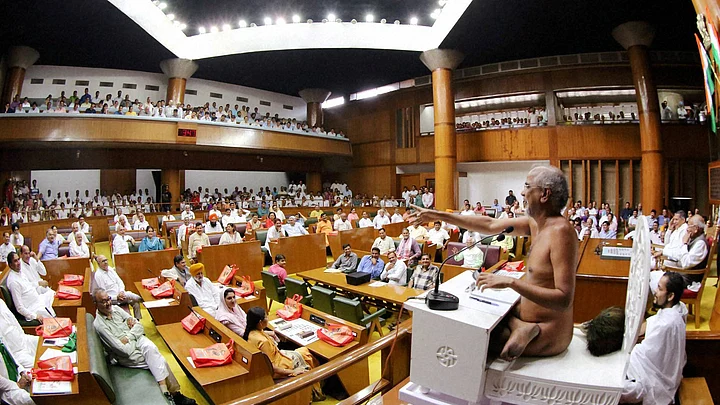On Friday afternoon, the Haryana Assembly witnessed an unprecedented event. The Assembly, which runs on the rules laid down by the Constitution and discusses issues of the common people, suddenly turned into a religious ceremony. Digambar Jain monk Tarun Sagar Maharaj delivered a lecture on issues ranging from peace of mind, to which is more important – religion or polity.
While social media was busy discussing whether a naked man should be allowed inside a Vidhan Sabha, I have more serious questions to ask. I have high regards for this monk as I have for any other religious leader. I have nothing against his naked appearance as it’s his personal choice based on religious beliefs.
But I think he should not have been invited to deliver sermons inside the House. To ensure that protocol was not violated, the discourse was held after the day’s proceedings were adjourned. So, technically, the monk addressed a meeting of MLAs, which happened to be inside the four walls of the Assembly, but practically, as we all know – the monk addressed the Haryana Assembly.
Here are 10 reasons why inviting the monk to lecture a state assembly was probably not the right thing to do.
10 Reasons to Ponder On
1. Inviting a religious leader inside the publicly elected Assembly goes against the principle of secularism, which is mentioned in the preamble of the Constitution of India. Even if everyone has the right to practice and profess his/her religion, the State is expected not to discriminate, patronise or meddle in the profession of any religion.
2. Only elected representatives, ministers and Assembly officials are allowed inside the House. Non-elected people are not allowed to enter or speak inside the Assembly. (There are few exceptions like the Attorney General, who is allowed to speak inside the Parliament.)
3. Since a monk of one religion has now addressed the MLAs, demands can be made by people of other religions. Will other religious functionaries be invited? If not, then will that not be discriminatory? If yes, how long will this go on for?
4. If more religious leaders are to be invited, what will be the criteria of chosing them? What is the process of picking one functionary among thousands?
5. Media reports from Haryana say that the monk was seated above the Chairman and Governor. If true, this demeans the Constitutional posts.
6. While speaking on a range of issues, the monk took a jibe at Pakistan. Indo-Pak ties constitute a highly sensitive matter, and when a religious leader speaks about it inside a state Assembly, it definitely becomes a matter of concern.
7. The monk said religion was like a husband and politics like a wife, and that the wife should “accept the discipline of the husband”. So, he essentially means that political leaders should listen to religious leaders. This is definitely not the modern India envisaged in our Constitution.
8. That a wife should accept the discipline of her husband is a highly objectionable statement, which is antithetical to gender equality.
9. That a religious leader is above a political leader, or the latter should listen to the prior is a medieval thought, which reflects in inviting the monk, as well as in his sermons.
10. Disturbingly, considering electoral mathematics, even the Opposition parties have kept quiet about this – Congress leaders in Haryana don’t want to talk about it.
What Does the Constitution Say About This?
I spoke with Constitutional experts about this. While Dr Subhash Kashyap, who was also the Secretary General of Lok Sabha was guarded in his response, Dr Ashok Chousalkar was upfront.
The House is the master of its opinion. We cannot question the wisdom of the House. Had it happened in the session, it would not have been in the spirit of the Constitution. But technically the monk did not address the Assembly (as it was adjourned), so it’s not a matter of Constitutional protocols, but a matter of propriety.Dr Subhash Kashyap, Constitutional Expert
Even if the House was adjourned technically, what happened was absolutely wrong and goes against the spirit of the Constitution.Dr Ashok Chousalkar, Constitutional Expert
While reading about Haryana, I found out that the revered monk has been invited to address MLAs in the Madhya Pradesh Assembly more than once, making Haryana the second state. Which will be the third one now?
PS: Remember High Sparrow?
Those who watch Game of Thrones are familiar with the fictional character ‘High Sparrow’. He is a righteous religious leader, who is given importance by the royal family. But, eventually, he grows more influential than the king and ends up complicating a lot of problems for the kingdom.
